
 |
|
|
|
Warners and the Warner Archive Collection has done so well with its promotion of Pre-Code movies that DVD buyers by now may associate stories of illicit relationships and sordid crime with the old Warner contract players -- Joan Blondell, Ann Dvorak, Ruth Chatterton, Una Merkel. We were even beginning to recognize the actors playing bellboys. Although we have also seen some good Pre-Code sizzlers from MGM, Universal and Paramount, the vaults of 20th-Fox still remain a mysterious pit of goodies. The good news is that TCM Vault Collection has led a DVD expedition into the Pre-Code film racks of Sony's Columbia Pictures. Part of the fun is seeing new faces among the stars and supporting players -- Barbara Stanwyck appears to have been a free agent, but we also get a gander at Jean Harlow before she was firmly fenced in at the MGM corral. We've heard plenty of monstrous stories about Columbia's Harry Cohn during these years. The uncouth mogul boosted director Frank Capra to superstar status while apparently running the scariest casting couch in town. But Cohn could really crank out the goods. Each of the five Pre-Code potboilers in this Columbia Pictures Pre-Code Collection has its own touch of class -- beyond the immodest proposals, compromised morals and class cruelty. They certainly weren't thrown together either. Writer Robert Riskin would become the main talent behind the 'Capracorn' films for which Frank Capra hogged all the credit. Jo Swerling had an equally distinguished career and contributed to Capra's It's a Wonderful Life. Their urban dramas pack formulaic stories with snappy, witty Depression-era dialogue. 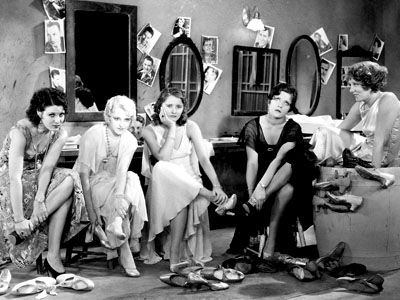
Speaking of scraping along at the bottom of the Depression years, 1931's Ten Cents a Dance features Rodgers and Hart's title song, which was so popular that a reprise at the film's finish plays out over a black screen: " - Come on, big boy, ten cents a dance." Barbara Stanwyck is Barbara, a dime a dance girl sick of being fondled by men that don't bathe. One partner chomps a big chaw of tobacco, right on the dance floor. She hides her job from her fiancé Eddie (Monroe Owsley), who gambles his money away and continues to whine for help. Barbara has a rich admirer in Bradley Carlton (Ricardo Cortez), a principled millionaire who is happy to give Eddie a job at his firm. Eddie marries Barbara but prefers to keep their relationship a secret, the better to hang around old friends with money. Eddie is soon embezzling money from Bradley. The foolishly faithful Barbara goes to Bradley for the money just as the financier is about to propose -- precisely because she's the only girl who never put the squeeze on him. How will Barbara learn that Eddie is a louse, and that Bradley is an honorable right guy? The amazing Stanwyck makes her alternately experienced and naíve dance hostess into a deserving heroine, coping with an impossible job situation where 250-pound men tread on her feet. Stanwyck is also heartbreaking when she tries to provide Eddie with a welcoming home, only to be repaid with selfish abuse. Ricardo Cortez often played slimy villains in bigger films but is here a stand-up guy, just looking for a girl who isn't a gold digger. One of the other dance hall girls is played by Sally Blane, who very closely resembles her famous sister Loretta Young. Broadway actor Monroe Owsley got typed as a weak and dissipated character; he died several years later from a heart attack, at the age of 36. 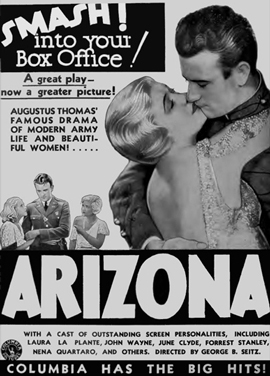
The odd film out in this stack is Arizona, a story of love and honor in the 1930s' 'jock strap army' that no serviceman would recognize. Cameraman George B. Seitz directs with a leaden foot so the appeal is all in the interesting cast. Lt. Bob Denton (john Wayne) is an Army football star and a favorite of Colonel Bonham (Forrest Stanley), who treats him like a son. Bob rather casually dumps his girlfriend Evelyn (Laura La Plante of The Cat and the Canary) when he's reassigned to a post back East. Having set her heart on a proposal, Evelyn plots a revenge by charming Colonel Bonham and marrying him instead; she follows Bonham to his remote Arizona training post, along with her sister Bonnie (June Clyde). Naturally Bob's assignment is soon switched to Bonham's post. Not only does Evelyn not get her payback, she must watch Bob romance her willing sister. How low will Evelyn go to make sure that Bob pays the price for offending her? Arizona has some dated aspects, especially a scene in which Bob gets into hot water after giving a lift to an oversexed Mexican "hot tamale" (Nena Quartero) who he allows to pour tequila down his throat. The concept has a problem in that Bob drops Evelyn because he sees no room for marriage in his footloose Army life. Less than a year later he's set on marrying another girl and the Army issue doesn't enter into the equation. The movie basically says that an Army officer can sleep around all he wants to, and women foolish enough not to hold out for marriage deserve everything they get. The story plays smoothly enough until the innocent Bob is suddenly being railroaded out of the Army; five or ten words of clarification would put an end to his problems. The saving grace of Arizona is its acting. A famous name not exactly easy to see these days, Laura La Plante is quite good. And the handsome John Wayne didn't go straight to "Z" westerns from his floppo biggo in The Big Trail -- he gives a sensitive and measured performance, at least when he's not wrestling Conchita in the front seat of his Model T Ford. 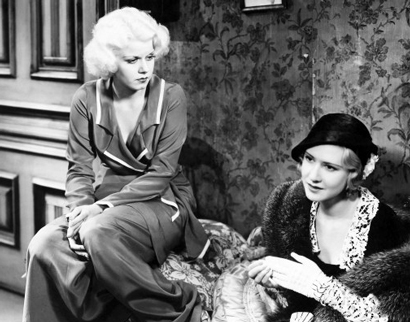
The collection finds its groove with 1932's Three Wise Girls a standard 'country girl hits the big town' tale with plenty of attractive qualities. Jean Harlow is sensuality personified as Cassie, a looker from the sticks who figures that her chances to make a living might be better in the big city. After fending off the advances of an employer or two Cassie is introduced to modeling by Gladys (Mae Clarke), a caring friend. Cassie finds millionaire Jerry (Walter Byron) amusing but holds him at bay until convinced that his intentions are honorable. That's when she discovers that he's already married. Gladys has been the girlfriend of a married man for quite a while, and Cassie doesn't care to follow in her footsteps -- the man's a total cad. Jerry rushes to explain that his wife will soon be suing him for divorce, only to find Cassie in what looks like a compromising situation. Will Cassie and her millionaire get together? If that plotline sounds weak, Three Wise Girls puts a fine polish on it. Platinum blonde Harlow is indeed a powerful erotic presence who must have set 1932 theater screens on fire. The calculation is there -- she spends more than a few scenes traipsing around the apartment in a silk nightgown -- but Harlow's "girl next door who might if you asked" vibe must have aroused every man in the audience. Mae Clarke almost loses her life to the Manhattan merry-go-round of women bartering their bodies for what comforts they can get. The third Wise Girl is Marie Provost, who plays the comical Dot, a stay-at-home typist who would like to find the perfect man, or for that matter, any man. She settles for Jerry's chauffeur, Andy Devine! The basic fantasy of these tales of female wish fulfillment is that a country lass from Indiana or Iowa will meet a handsome millionaire while working behind a breakfast counter. I think that a Manhattan rake on the make might indeed check on what's cookin' down at the all-night eatery. But if he found a looker like Cassie he'd more likely than not employ some slick approach that would get her into his bed for little more than the price of a hot meal. 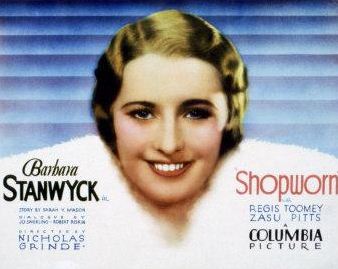
Love across class boundaries gets a workout in Shopworn, another show elevated by a strong performance from Barbara Stanwyck. Waitress Kitty Lane (Stanwyck) maximizes her tips by teasing the college boys but her heart goes for the serious medical student David (Regis Toomey). David's intolerably snooty, grasping mother Helen (Clara Blandick) gives Kitty the cold shoulder and demands that David drop her. Helen's lawyer cooks up a fake heart disease to pull David away from Kitty, but the problem is solved when Kitty is framed on a morals charge and sent to prison. Seven years later Kitty is a singing star on Broadway; neither she nor David realize that their break-up was a trick. When they re-meet Helen is again prepared to go to extreme lengths to keep her son for herself. But Kitty is no longer a powerless waitress. Director Nick Grinde and Stanwyck propel Shopworn in high style, aided by some great dialogue by Jo Swerling and Robert Riskin. The drama protests the way the status quo victimizes single females, the kind of social theme that Code enforcement would soon discourage. A prologue shows Kitty simply cast adrift after losing her father to a needless mining accident. The horrid Helen uses her influence to pervert the law as a weapon against the innocent girl. The story's biggest surprise is the final reconciliation. Simple justice demands that David's mother perish with a stake driven through her heart. Barbara Stanwyck delivers one really great burst of outraged dialogue, when Helen's unctuous lawyer attempts to buy her off. But the scenarists stumble over an absurd transition about halfway through. The feature has played for forty minutes at a measured pace in ordinary settings. Just released from prison, Kitty shows no sign of having any particular talent or desire for the remote world of theatrics. She's barely hit the sidewalk when the picture zooms into a show biz montage that takes her from nobody to a Broadway star in less than sixty seconds. Suddenly Kitty seems a completely new person in a new movie altogether. Note: It has been determined that Shopworn was re-cut for reissue after the Code Enforcement; this is the only version so far found by Columbia. (Thanks to Stefan Andersson and Joe Dante.) Zasu Pitts provides delightful comedy relief as a dishwasher who becomes Kitty's personal backstage maid; her line deliveries are exactly like those of Popeye's Olive Oyl. The college seen at the beginning is actually UCLA, then just six years old. Today's students may recognize the Powell Library, and little else. 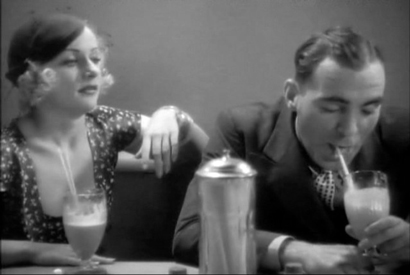
Writer Robert Riskin's 1932 Virtue displays the collection's most daring subject matter and most interesting plot. Columbia's transfer includes the audio but not the video for a brief censored opening scene of a group of prostitutes being lectured by a judge. Ordered to leave town with the other women, Mae (Carole Lombard) immediately returns to downtown Manhattan. She makes a friend in cabdriver Jimmy Doyle (Pat O'Brien) by seeking him out to pay a small debt; the wary fellow is unaware of her background. Determined not to fall back into her previous line of work, Mae nevertheless hangs out with Lil Blair (Mayo Methot), a tough gal who thinks her boyfriend Toots O'Neil (menacing Jack La Rue) is on the level. Toots has several scams in the works including cheating on Lil with Gert (Shirley Grey). Mae and Jimmy marry and she settles down in his tiny apartment. Jimmy is overjoyed that he's finally found a girl that can be trusted, as has his best friend Frank (Ward Bond). Together Mae and Jimmy save money so he can buy a filling station of his own. But Mae allows herself to be fleeced by Toots and Gert, in a way that convinces Jimmy that she's been a lying snake all along. Is there any hope for the forlorn Mae, or are women like her just naturally doomed? Virtue is the most polished film in the collection. It works as a social drama, a crime story about a fallen woman and also as a precursor to the Screwball Comedy. Carole Lombard interesting Mae has a comic edge that recalls Lucille Ball with the slapstick toned way down. Mae's proud greeting for Jimmy the cabdriver, returning the fare she didn't pay the day before, is pure Lombard. Her domestic problems are serious, yet handled in a comic fashion. Mae foolishly gives away her husband's nest egg when she falls for Gert's faked sick act. Then Frank comes in the door wailing because Gert tricked him out of his bankroll as well. Mae's reaction is pure Lucy Ricardo. The absurd coincidences that convince Jimmy of Mae's infidelity also seem like something out of a farce, until the truth rights all wrongs. Carole Lombard is another fascinating personality, who can carry a show simply because we're intrigued to find out what she does next. Fast talking Pat O'Brien is acceptable as the dimwitted husband, but Mayo Methot makes a stronger impression as the loyal Lil. Unfortunately Ms. Methot's reputation as an actress is clouded by stories of her stormy marriage to Humphrey Bogart. Also effective is the creepy Jack La Rue, an actor that excelled as slimy villains. His claim to fame is his performance in the notorious, legendary The Story of Temple Drake, an unusually racy Pre-Code that did a lot toward bringing down the hammer of reform. The TCM Vault Collection's DVD set Columbia Pictures Pre-Code Collection is a beautifully remastered set of discs. Sony's restoration department lavishes care on every Columbia title it can service, and each of these vintage B&W winners look as if they were filmed last week. Contrast and detail are excellent, with lighting cameramen Ernest Haller, Gilbert Warrenton and Joseph Walker sculpting attractive close-ups for the female stars even when they're supposed to be down and out. It's a nice change of pace to see Jean Harlow perform without quite so much of the fussy MGM glamour treatment. Carole Lombard is magnetically attractive, and Barbara Stanwyck gains points for looking fascinating under trying conditions. TCM gives us a text essay on the first disc and several galleries of advertising art and production stills. The only regret we have for the collection is the lack of subtitles, which will keep these pictures from being enjoyed by older hearing-impaired viewers. It seems that only top studio releases still consistently offer removable subtitles.
On a scale of Excellent, Good, Fair, and Poor,
Columbia Pictures Pre-Code Collection rates:
Reviews on the Savant main site have additional credits information and are often updated and annotated with reader input and graphics. Also, don't forget the 2011 Savant Wish List. T'was Ever Thus.
Review Staff | About DVD Talk | Newsletter Subscribe | Join DVD Talk Forum |
| ||||||||||||||||||